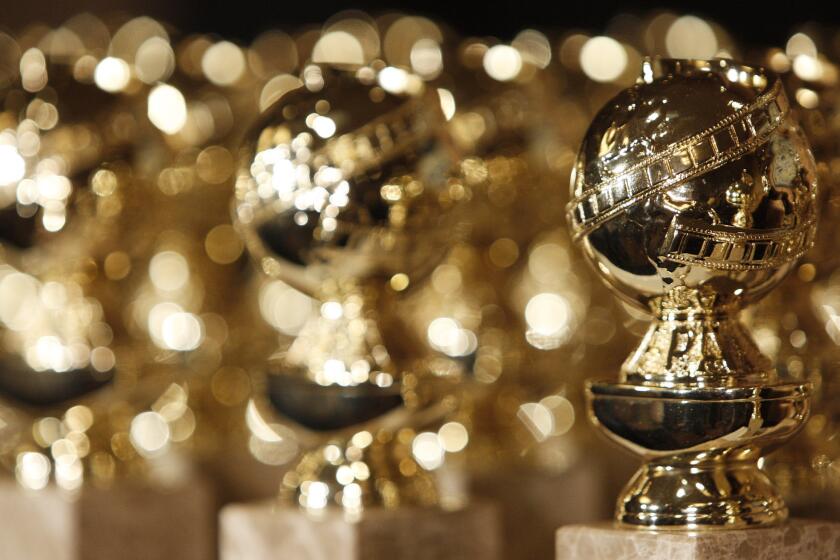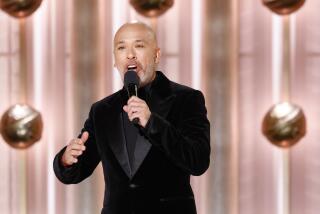Column: If there’s a theme to the 2020 Golden Globes nominations, it’s ‘all men, all the time’
- Share via
On Monday, Sports Illustrated made Megan Rapinoe its Sportsperson of the Year, while the Hollywood Foreign Press Assn. announced that no female directors or writers were worthy of a Golden Globe nomination this year. Indeed, no English-language live action film directed by, written by or even, with a few exceptions, featuring women was worth calling one of the year’s best.
Oh sure, voters had to come up with a list of female names to fill the lead actress categories for this year’s Golden Globe awards. But of those 10 women (five in drama, five in comedy) only three match up with films nominated in the three live action feature categories (drama film, comedy or musical film, foreign language film).
Three, compared with the nine out of 10 lead actors nominated for films that were also nominated.
The nominations for the Golden Globes have been announced, with “Marriage Story,” “The Irishman” and “Once Upon a Time... in Hollywood” earning the biggest hauls
The night before, CNN named Freweini Mebrahtu the 2019 hero of the year for her work to ensure that Ethiopian girls be allowed to continue their education even while menstruating, while the HFPA decided that Scarlett Johansson, nominated for “Marriage Story,” was the only woman to do great work as a lead in a great drama this year, ditto “Knives Out’s” Ana de Armas for comedy and Awkwafina in foreign-language nominee “The Farewell.”
All the rest had, apparently, given terrific performances in not so terrific films.
Golden Globe voters also decided that no female director or screenwriter was worth nominating this year. Not. One.
But then according to the HFPA, all the very best films are about men. “Rocketman,” “Once Upon a Time … in Hollywood,” “1917,” “Dolemite Is My Name,” “The Irishman,” “Joker,” “The Two Popes,” even “Jojo Rabbit,” revolve almost exclusively around male characters. Two of them have “man” in the title! (Three if you count “Popes.”)
While awards voters are often blamed, unfairly, for the industry’s failure to greenlight films directed by women or that do not follow the male-centric model — and therefore limit the number of exceptional female-driven contenders to choose from — that was not the case this year, especially for the Globes, which has categories for both drama and comedy. (In film and television, women typically fare better in comedy, even when that comedy is as dark and dramatic as, say, “Nurse Jackie.”)
This year, despite the amount of oxygen hogged by cinematic notables like Martin Scorsese, Quentin Tarantino and Noah Baumbach (who was passed over in the directing category but not in best dramatic picture and screenwriting), there were several female-led and female-directed awards-worthy films that seemed intentionally overlooked.
Olivia Wilde’s delightful female-led “Booksmart” and Lorene Scafaria’s “Hustlers” received exactly one nomination each — Beanie Feldstein (“Booksmart”), lead actress in a comedy; and Jennifer Lopez (“Hustlers”), supporting actress. Greta Gerwig’s lovely “Little Women” received two nods, including Saoirse Ronan for lead actress in a drama.
Emma Thompson and Cynthia Erivo were nominated for films helmed by women (“Late Night” was directed by Nisha Ganatra and written by Mindy Kaling; Kasi Lemmons directed and co-wrote “Harriet”), so I guess that’s something.
Celine Sciamma’s “Portrait of a Lady on Fire” was nominated for foreign language film but nothing else, Marielle Heller’s “A Beautiful Day in the Neighborhood” was only nominated for Tom Hanks’ turn as Mister Rogers and Alma Har’el’s “Honey Boy” was nowhere to be found.
After Har’el tweeted her disgust with this year’s exclusion of female directors, HFPA President Lorenzo Soria told Variety that the group votes by “film and accomplishment” as opposed to gender, which fell just slightly short of then-now-former Recording Academy President Neil Portnow‘s suggestion that if women want to win more Grammys, they need to “step up.”
But just slightly.
Now, this is the part where I am required by law to inform you that the voting body of the HFPA is a teeny tiny group of foreign entertainment journalists who have never met a shrimp spread, A-lister or gift bag they did not like and so we should not take anything they do seriously because it Does Not Matter.
Except it does. The HFPA may be a very small, shrimp-loving and star-struck island and the Golden Globes may remain a day-drinker of a show. But over the years, as all sorts of awards shows have grown in number and influence, the Globes have become the unofficial — but still kind of official — first and main predictor/influencer of the Oscar race.
Every year many people argue that the Oscars also don’t matter, but that only makes those people look stupid.
The South Korean sensation “Parasite” came out on top in a very international year for the Los Angeles Film Critics awards. Predicting Oscars is hardly the point.
If you’re talking about identifying and rewarding intrinsic worth, no award matters because only God can do that, and only if you believe God exists. Which many smart, lovely and worthwhile people do not. So you see the bind.
But the Oscar nominees and winners absolutely identify and determine what kind of films will have an easier time getting made and marketed, especially during awards season.
Films that resemble past winners.
So when you look at this year’s “all men, all the time” list of Golden Globes nominees, it’s difficult not to lose heart. With any luck, this is the year that the Globes sees its power and influence dim. With any luck, this is the year when Oscar voters, a much bigger and more diverse group, see the Globes lists as more time machine than template.
With any luck, all the other awards voters will realize that just as #OscarsSoWhite made it clear that it was time to stop defining “best” by standards that begin with “about white people” it’s time to look beyond standards that begin with “about men.”
One glance at some of the vicious social media reactions to Rapinoe’s anointment offers an explanation of why the film industry clings to its old models — change is hard and change is scary.
But by God if “Sports Illustrated” can do it, so can Hollywood.
The HFPA has made strides to improve its reputation. But the voters behind the Golden Globes still have a blind spot when it comes to women.
More to Read
Only good movies
Get the Indie Focus newsletter, Mark Olsen's weekly guide to the world of cinema.
You may occasionally receive promotional content from the Los Angeles Times.












